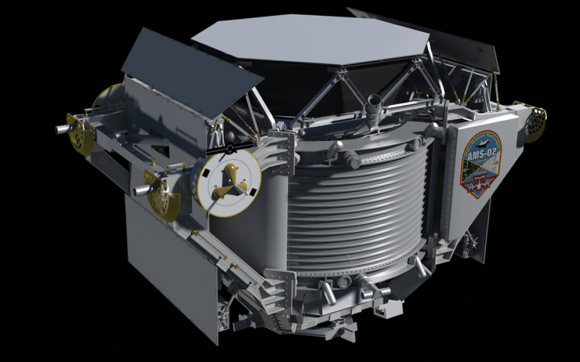

The AMS-02 instrument, shown here attached to the outer hull of the ISS. Credit: BASA
Since it was first proposed in the 1960s to account for all the “missing mass” in the Universe, scientists have been trying to find evidence of dark matter. This mysterious, invisible mass theoretically accounts for 26.8% of the baryonic matter (aka. visible matter) out there. And yet, despite almost fifty years of ongoing research and exploration, scientists have not found any direct evidence of this missing mass.
However, according to two new research papers that were recently published in the journal Physical Review Letters, we may have gotten our first glimpse of dark matter thanks to an experiment aboard the International Space Station. Known as the Alpha Magnetic Spectrometer (AMS-02), this a state-of-the-art particle physics detector has been recording cosmic rays since 2011 – which some theorize are produced by the annihilation of dark matter particles.
Like its predecessor (the AMS), the AMS-02 is the result of collaborative work and testing by an international team composed of 56 institutes from 16 countries. With sponsorship from the US Department of Energy (DOE) and overseen by the Johnson Space Center’s AMS Project Office, the AMS-02 was delivered to the ISS aboard the Space Shuttle Endeavour on May 16th, 2011.


Ostensibly, the AMS-02 is designed to monitor cosmic rays to see how much in the way of antiprotons are falling to Earth. But for the sake of their research, the two science teams also been consulted the data it has been collecting to test theories about dark matter. To break it down, the WIMPs theory of dark matter states that it is made up of Weakly-Interacted Massive Particles (WIMPS), protons and antiprotons are the result of WIMPs colliding.
By monitoring the number of antiprotons that interact with the AMS-02, two science teams (who were working independently of each other) hoped to infer whether or not any of the antiprotons being detected could be caused by WIMP collisions. The difficulty in this, however, is knowing what would constitute an indication, as cosmic rays have many sources and the properties of WIMPs are not entirely defined.
To do this, the two teams developed mathematical models to predict the cosmic ray background, and thus isolate the number of antiprotons that AMS-02 would detect. They further incorporated fine-tuned estimates of the expected mass of the WIMPs, until it fit with the AMS-02 data. One team, led by Alessandro Cuoco, was made up of researchers from the Institute for Theoretical Particle Physics and Cosmology.
Using computer simulations, Cuoco and his colleagues examined the AMS-02 data based on two scenarios – one which accounted for dark matter and one which did not. As they indicate in their study, they not only concluded that the presence of antiprotons created by WIMP collisions better fit the data, but they were also able to constrain the mass of dark matter to about 80 GeV (about 85 times the mass of a single proton or antiproton).
As they state in their paper:
“[T]he very accurate recent measurement of the CR antiproton flux by the AMS-02 experiment allows [us] to achieve unprecedented sensitivity to possible DM signals, a factor ~4 stronger than the limits from gamma-ray observations of dwarf galaxies. Further, we find an intriguing indication for a DM signal in the antiproton flux, compatible with the DM interpretation of the Galactic center gamma-ray excess.”
The other team was made up of researchers from the Chinese Academy of Sciences, Nanjing University, the University of Science and Technology of China, and the National Center for Theoretical Sciences. Led by Ming-Yang Cui of Nanjing University, this team made estimates of the background parameters for cosmic rays by using prior data from previous boron-to-carbon ratio and proton measurements.
These measurements, which determine the rate at which boron decays into carbon, can be used to guage the distance that boron molecules travel through space. In this case, they were combined with proton measurements to determine background levels for cosmic rays. They incorporated this data into a Bayesian Analysis framework (i.e. a statistical model used to determine probabilities) to see how many antiprotons could be attributed to WIMP collisions.
The results, as they state it in their paper were quite favorable and produced similar mass estimates to the study led by Cuoco’s team. “Compared with the astrophysical background only hypothesis, we find that a dark matter signal is favored,” they write. “The rest mass of the dark matter particles is ?20 – 80 GeV.”
What’s more, both scientific teams obtained similar estimates when it came to cross-section measurements of dark matter – i.e. the likelihood of collisions happening based on how densely dark matter is distributed. For example, Cuoco’s team obtained a cross-section estimate of 3 x 10-26 per cm³ while Cui’s team obtained an estimate that ranged from 0.2 – 5 × 10-26 per cm³.
The fact that two scientific teams, which were operating independently of each other, came to very similar conclusions based on the same data is highly encouraging. While it is not definitive proof of dark matter, it is certainly a step in the right direction. At best, it shows that we are getting closer to creating a detailed picture of what dark matter looks like.
And in the meantime, both teams acknowledge that further work is necessary. Cuoco and his team also suggest what further steps should be taken. “Confirmation of the signal will require a more accurate study of the systematic uncertainties,” they write, “i.e., the antiproton production cross-section, and the modeling of the effect of solar modulation.”
While scientists have attempted to find evidence of dark matter by monitoring cosmic rays in the past, the AMS-02 stands apart because of its extreme sensitivity. As of May 8th, the spectrometer has conducted measurements on 100 billion particles. As of the penning of this article, that number has increased to over 100,523,550,000!
Further Reading: PBS Nova Next, Ars Technica, Physical Review Letters, (2)
It’s not uncommon for space missions to be tested here on planet Earth. With the…
Some of our Solar System's moons have become very enticing targets in the search for…
Gateway’s HALO module heads to the U.S., on its long path to orbiting the Moon.…
What if I told you there was a secret window, and if you looked through…
Every Martian year (which last 686.98 Earth days), the Red Planet experiences regional dust storms…
If Intermediate-Mass Black Holes (IMBHs) are real, astronomers expect to find them in dwarf galaxies…